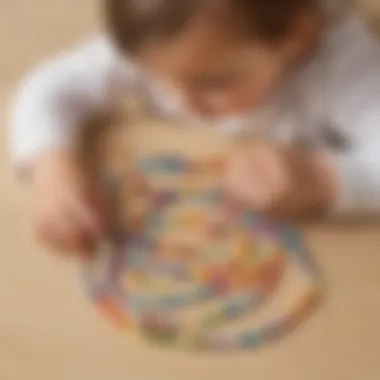Unleashing Potential: The Transformative Power of Pre-Writing Practice for Preschoolers


Fun Activities Ideas
Embarking on pre-writing practice for preschoolers can be a delightful journey filled with enriching experiences. To foster their motor skills and cognitive development, engaging in fun indoor activities is paramount. Through imaginative play using building blocks, coloring, and playing with sensory bins, children can enhance their hand-eye coordination and creative thinking. Outdoor adventures further stimulate physical movements and spatial awareness, encouraging kids to explore nature and develop their observational skills.
Arts and crafts serve as a creative outlet for preschoolers to express themselves while honing their fine motor skills. By engaging in activities like finger painting, paper cutting, and clay modeling, children not only refine their dexterity but also unleash their creativity. Science experiments offer a hands-on approach to learning, fostering curiosity and critical thinking. Simple experiments like creating volcanoes or observing plant growth can spark a child's interest in the world around them.
Cooking and baking activities provide a multisensory experience for youngsters to follow instructions, measure ingredients, and learn about food preparation. Through tasks like mixing, pouring, and decorating, children improve their coordination and patience, all while grasping essential life skills in the kitchen environment.
Educational Games
Integrating educational games into pre-writing practice not only reinforces academic concepts but also makes learning enjoyable for preschoolers. Math and logic games challenge children to think logically, enhance problem-solving abilities, and promote numeracy skills. Language and vocabulary games aid in language development, vocabulary expansion, and linguistic fluency, laying a strong foundation for reading and writing.
STEM activities encompass science, technology, engineering, and mathematics, offering hands-on learning experiences that cultivate innovation and analytical thinking. From building simple machines to conducting basic coding exercises, children engage in experiential learning while acquiring essential STEM skills. History and geography puzzles expose kids to different cultures, historical events, and global geography, fostering a curiosity about the world.
Interactive learning apps present a digital avenue for preschoolers to enhance their cognitive skills through engaging games and activities. These apps cater to various learning styles and preferences, providing a dynamic platform for children to explore educational content in an interactive and engaging manner.
Seasonal and Holiday Activities
Celebrating seasonal festivities and holidays through engaging activities can enrich preschoolers' pre-writing practice with excitement and creativity. Valentine's Day crafts offer an opportunity for children to express their affection through handmade cards, heart-shaped crafts, and imaginative projects. Halloween costume ideas spark creativity and allow kids to explore different characters and themes while fostering their imagination.
Thanksgiving cooking projects involve children in the culinary traditions of the holiday, enabling them to participate in meal preparation, learn about gratitude, and develop practical cooking skills. Christmas decorations provide a festive outlet for kids to engage in ornament-making, tree-decorating, and joyful crafting activities that instill a sense of holiday spirit.
New Year's resolutions for kids promote reflection, goal-setting, and personal growth, encouraging children to express their aspirations, cultivate positive habits, and embark on a new year with intention and determination.
Parenting Tips and Resources
Supporting preschoolers in their pre-writing journey requires thoughtful parenting strategies and valuable resources. Encouraging creativity through open-ended play, artistic expression, and exploration nurtures children's imagination and problem-solving skills. Setting up a playful learning environment at home or in school is essential for creating a conducive space that motivates children to engage in pre-writing activities with enthusiasm.


Balancing screen time and playtime is crucial in today's digital age to ensure that children enjoy a healthy blend of technology use and hands-on experiences. Building strong family bonds through quality time, shared activities, and meaningful conversations fosters emotional well-being and strengthens relationships within the family unit.
Motivating kids to stay active through physical play, outdoor adventures, and sports activities promotes overall health, enhances motor skills, and cultivates a positive attitude towards physical fitness and well-being.
Fun Facts and Trivia
Exploring fun facts and trivia with preschoolers adds an element of discovery and intrigue to their pre-writing practice. Delving into the animal kingdom unveils fascinating narratives about wildlife, habitats, and survival strategies, igniting children's curiosity about the natural world. Learning about famous inventions unveils the stories behind groundbreaking creations, inspiring kids to innovate and think critically about human ingenuity.
Delving into historical events tailored for young audiences introduces children to significant moments in history, cultural advancements, and key figures, fostering an appreciation for the past. Exploring mythical creatures in folklore and legends sparks imagination and creativity, encouraging children to appreciate diverse narratives and fantastical worlds.
Embarking on space adventures and discoveries leads children on a cosmic journey through our universe, introducing them to celestial bodies, space exploration, and the wonders of the cosmos, inspiring curiosity and awe.
Introduction
In this meticulously crafted article, we delve into the profound significance of pre-writing practice for preschoolers. Far beyond mere scribbles on paper, the act of pre-writing serves as a foundational pillar in the development of crucial skills essential for a child's overall growth. By focusing on specific elements such as fine motor skill development, hand-eye coordination, and cognitive benefits, we aim to illuminate the intrinsic value of nurturing these skills in the early years of a child's life.
As we venture into this exploration, we recognize that pre-writing is not just about holding a pencil; it symbolizes a child's initiation into the world of communication and expression. This introductory section sets the stage for a deep dive into the multi-faceted world of pre-writing activities and their profound impacts on a child's holistic development. By understanding the core components like fine motor skills, hand-eye coordination, and cognitive enhancements, parents, educators, and caregivers can grasp the pivotal role pre-writing plays in laying a strong foundation for future academic success and overall wellbeing.
Moreover, we must underscore the critical role that pre-writing activities play in shaping a child's creativity, problem-solving abilities, and preparation for the academic journey ahead. Through an intricate web of drawing, tracing exercises, playdough engagements, and sensory experiences, children not only refine their motor skills but also harness their imaginative capabilities. Hence, this section serves as a gateway to unlocking the boundless potential housed within a child's mind, emphasizing the transformative power of pre-writing practice in sculpting young intellects for a vibrant future.
In paving the way for a comprehensive guide to pre-writing, this article aims to navigate through the intricate landscape of supporting preschoolers in their writing development journey. From parental involvement to integrating writing into daily routines and leveraging technology for enhanced practice, each aspect elucidates the role of different stakeholders in nurturing a child's pre-writing prowess. The synthesis of diverse strategies and techniques underlines the collaborative effort needed to empower young minds and cultivate a generation of adept communicators and critical thinkers, paving the way for their flourishing in a dynamic educational landscape.
Understanding Pre-Writing Skills
In this pivotal article on the crucial role of pre-writing practice for preschoolers, delving into the realm of Understanding Pre-Writing Skills serves as a foundational cornerstone. This section offers profound insights into the specific elements that encompass mastering pre-writing skills, shedding light on its profound benefits and the essential considerations every caregiver, educator, or parent should deliberate on. Understanding Pre-Writing Skills embarks on a journey to unravel the intricate connection between a child's early development and their future capabilities.
Fine Motor Skill Development


Within the spectrum of pre-writing skills, Fine Motor Skill Development emerges as a fundamental aspect that demands careful attention. These skills involve the coordination of small muscle movements in the hands and fingers, laying a critical foundation for a child's ability to hold and control writing tools effectively. By honing fine motor skills through engaging activities and exercises, preschoolers can enhance their dexterity, precision, and overall hand-eye coordination, setting the stage for proficient writing capabilities in the future.
Hand-Eye Coordination
Hand-Eye Coordination stands as another key component of pre-writing skills, highlighting the seamless integration of visual information from the eyes with precise hand movements. This skill is vital for tasks that require manual dexterity, such as drawing shapes, tracing lines, or forming letters. By fostering hand-eye coordination through targeted activities like threading beads, completing puzzles, or painting, preschoolers can refine their ability to translate visual inputs into controlled hand motions, laying a solid groundwork for proficient writing skills.
Cognitive Benefits
The cognitive benefits intertwined with pre-writing skills unveil a multifaceted array of advantages that extend beyond mere penmanship. Engaging in pre-writing activities stimulates cognitive processes such as problem-solving, memory recall, and spatial awareness. Furthermore, these activities promote creative thinking, enhance concentration, and foster critical thinking skills in young learners. By nurturing cognitive development through pre-writing practices, preschoolers can fortify their mental acuity, resilience, and adaptability, essential traits for navigating the complexities of academic and social environments with confidence.
Importance of Early Writing Readiness
Enhancing Creativity
Creativity is a fundamental attribute nurtured through effective Early Writing Readiness activities. By engaging preschoolers in diverse pre-writing exercises such as drawing, coloring, and imaginative play, their creative thinking and expression skills are enriched. Encouraging children to explore different mediums for artistic expression ignites their imagination and aids in the development of unique perspectives. The process of creating and translating thoughts onto paper through various pre-writing activities fosters a sense of innovation and originality in young minds. Creative expression is not just about artistic endeavors but also about problem-solving, critical thinking, and exploring unconventional solutions to challenges.
Boosting Problem-Solving Skills
Early exposure to pre-writing exercises not only enhances creativity but also boosts problem-solving skills in preschoolers. Activities such as tracing shapes, connecting dots, and forming patterns stimulate logical thinking and spatial reasoning in young children. By engaging in these activities, preschoolers learn to analyze tasks, identify patterns, and strategize solutions, thus laying a strong foundation for advanced problem-solving abilities. Developing problem-solving skills at an early age equips children with the tools to tackle challenges, adapt to new situations, and approach tasks with a structured and analytical mindset. These skills are essential for academic success and overall cognitive development.
Preparing for Academic Success
The integration of Early Writing Readiness practices plays a pivotal role in preparing preschoolers for academic success in the future. By honing foundational skills such as fine motor control, hand-eye coordination, and cognitive abilities through pre-writing activities, children develop a strong educational base. These essential skills not only support handwriting proficiency but also lay the groundwork for future learning endeavors. Enhancing Early Writing Readiness is more than just a preparatory step for formal education; it is a holistic approach to equipping children with the necessary skills and confidence to excel in academic pursuits. By prioritizing Early Writing Readiness, parents and educators set young learners on a trajectory towards long-term academic achievement and cognitive growth.
Effective Pre-Writing Activities
In the realm of preschooler development, the section on Effective Pre-Writing Activities shines as a beacon of fundamental importance. These activities serve as the cornerstone for honing the crucial skills necessary for future writing endeavors. By engaging in well-thought-out pre-writing exercises, children not only refine their fine motor skills but also enhance their hand-eye coordination and cognitive abilities. The significance of these activities lies in their ability to lay a solid foundation for the intricate art of writing, setting the stage for academic achievement and cognitive prowess.


Drawing and Tracing Exercises
Drawing and tracing exercises hold a pivotal role in fostering pre-writing skills among preschoolers. These activities not only stimulate creativity but also aid in the development of hand-eye coordination. Through drawing and tracing, children learn to control their hand movements, which is paramount for writing proficiency. Additionally, these exercises provide a platform for young ones to express themselves artistically, nurturing their imagination and artistic abilities. Parents and educators should encourage this practice as it prepares children for the structured writing tasks they will encounter in their educational journey.
Playdough and Manipulative Play
Playdough and manipulative play are vital components of effective pre-writing activities for preschoolers. The tactile nature of playdough engages children's senses, allowing them to explore different textures and shapes. Manipulating playdough not only strengthens fine motor skills but also enhances hand strength, essential for writing control. Furthermore, this hands-on activity promotes creativity and imagination, encouraging children to experiment with various forms and structures. Integrating playdough into pre-writing practice can significantly boost a child's readiness for writing tasks, making learning a fun and interactive experience.
Sensory Writing Experiences
Sensory writing experiences offer a multi-dimensional approach to pre-writing practice, engaging children's senses and cognitive abilities. By incorporating different sensory elements such as sand, rice, or shaving cream into writing exercises, kids experience a hands-on and immersive learning process. These sensory activities not only enhance fine motor skills but also stimulate cognitive development by encouraging children to use multiple senses simultaneously. The sensory engagement strengthens neural connections, laying a robust foundation for future writing endeavors. Parents and educators can harness the power of sensory writing experiences to enrich pre-writing practice, making learning dynamic and impactful.
Supporting Preschoolers' Writing Development
In this segment, we delve deep into the pivotal role of supporting preschoolers' writing development within the framework of pre-writing practice. Parents, educators, and caregivers play a crucial role in nurturing young children's writing skills. Parental involvement and encouragement are vital components in honing a preschooler's writing abilities. By actively participating in a child's writing journey, parents not only instill confidence but also foster a positive attitude towards learning.
Parental Involvement and Encouragement
Parental involvement is the cornerstone of a child's developmental milestones, and when it comes to writing, the impact is profound. Encouraging children to engage in various writing activities, whether through simple drawing exercises or letter tracing, can significantly boost their writing skills. Praise and positive reinforcement from parents can motivate preschoolers to explore their creative expression through writing. Moreover, parents can create a conducive environment at home that promotes writing, such as setting up a designated writing space with an array of writing materials.
Integrating Writing into Daily Routines
Integrating writing into daily routines is a strategic approach to seamlessly incorporate writing practice into a child's day-to-day activities. By infusing writing exercises into tasks like making grocery lists, writing thank-you notes, or journaling daily activities, children can develop a natural affinity towards writing. This repeated exposure not only enhances writing skills but also aids in developing a sense of discipline and routine in young learners. Through consistent engagement with writing in various contexts, preschoolers can gradually improve their writing proficiency and creativity.
Utilizing Technology for Writing Practice
In today's digital age, technology offers innovative avenues for facilitating writing practice among preschoolers. Educational apps, interactive writing tools, and child-friendly devices can be valuable assets in enhancing a child's writing experience. By incorporating technology into writing activities, children can explore diverse writing formats, engage with interactive platforms, and receive immediate feedback on their writing exercises. However, it is essential for parents and educators to monitor screen time and ensure a balanced approach between technology-based writing practice and traditional hands-on activities to promote holistic development.
Conclusion
Pre-writing activities not only foster creativity but also nurture problem-solving skills, shaping a child's mindset to approach challenges with agility and innovation. The meticulous exploration of how these activities prepare children for academic triumph underscores the strategic importance of early intervention in cultivating a fertile ground for intellectual advancement. By enunciating the symbiotic relationship between pre-writing readiness and overall academic prowess, we underscore the correlation between nurturing creativity and a child’s success trajectory.
Throughout this article, we have meticulously delved into various strategies, such as drawing and tracing exercises, playdough engagement, and sensory writing experiences, to provide a roadmap for parents, educators, and caregivers. By elucidating the pivotal role of parental involvement, intertwining writing into daily routines, and embracing technology for efficient practice, we equip our audience with valuable insights and actionable steps to bolster a child’s development.
In essence, the Conclusion section of this article underscores not only the importance of pre-writing practice but also showcases the symbiotic impact it has on a child's holistic growth. By fostering a nurturing environment rich in supportive interactions and strategic interventions, we pave the way for a generation of adept individuals ready to navigate the complexities of an increasingly dynamic world.



